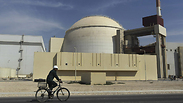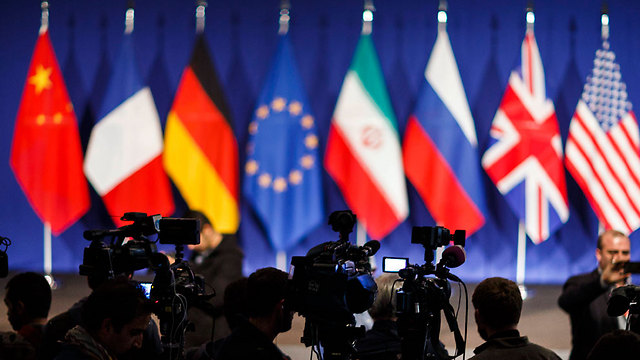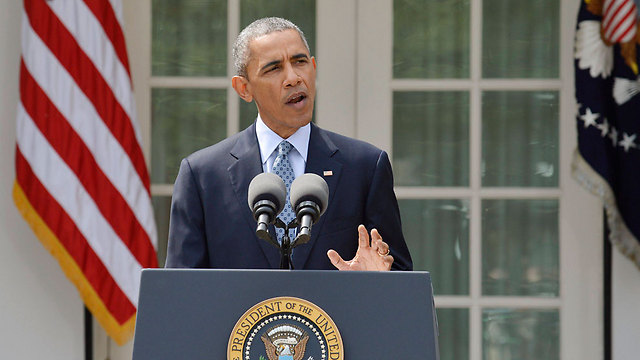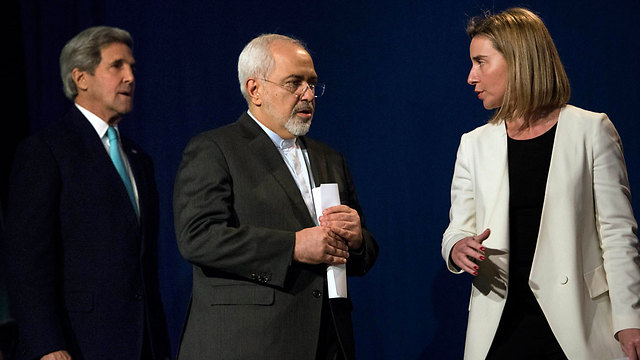The 'framework' agreement reached in Lausanne between world powers and Iran appears to be a good deal. But we must be wary of appearances – too many key issues still remain unresolved.
The pace in which the sanctions on Iran would be lifted is one example, while the future of the enriched uranium stock that Tehran already possesses is another example in a series of serious questions.
However, the agreement presented on Thursday night by President Barack Obama, by Secretary of State John Kerry, and by Iranian Foreign Minister Zarif, was surprisingly detailed.
Most importantly, though, is the matter of whether the implementation of the agreement will soften over the years. Another obstacle to the success of the deal is Tehran's penchant for finding creative ways to bypass restrictions, as it had in the past.
But, if the framework presented becomes the final agreement, including its technical addendum, even Israel could learn to live with it. As President Obama said, the current deal prevents Iran from developing enough fissile material for an explosive device or a nuclear bomb – for at least 10 years. If Tehran chooses to violate the deal, it will take them more than a year to gather enough enriched material for a single nuclear device.
We could not have achieved a better outcome even if Israel, the United States, and other countries had carried out military strikes on the nuclear sites in Iran. Even if the attack had been successful, the delay caused to the Iranian nuclear weapon program would have been shorter than 10 years.
Thus, it appears, it was a good deal.
Nonetheless, we cannot ignore the loopholes in the agreement. It remains unclear what happens after 10 years. And can the Americans, the United Nations, and the Europeans reinstate the sanctions regime if Iran breaks the agreement?
Lest we forget, the underground facility in Fordow is also a potential problem. According to the agreement, Iran will not enrich uranium in the secretive site, buried under 80 meters of rock.
Supposedly, the facility will be converted to a research and development center for nuclear physics – a hazy term, especially after Iranian Foreign Minister Zarif clarified that the thousands of centrifuges already installed in Fordow will not be dismantled.
That means the centrifuges will be ready and available should the Iranians decide to renew uranium enrichment at full capacity – a worrying proposition due to the 2,000 newer modules, capable of enriching at three times the rate of the old centrifuges.
The Fordow facility, unlike many of the other sites, is difficult to strike. All the Iranians need to do is tell the UN inspectors that they cannot inspect the facility and then hasten their pursuit of a nuclear weapon while enriching uranium at a faster pace than ever before.
Tehran could take advantage of a situation in which the attention of the international community is diverted – as North Korea did in its pursuit of the Bomb.
The fate of the agreement also hinges on Iran's most advanced centrifuges, capable of enriching uranium at 20 times the rate of the original model. There may be a 10-year restriction on their usage for uranium enrichment, but what happens next?
For the duration of the agreement, Iran will be allowed to research and develop – and likely even manufacture – advanced centrifuges. The matter is a grave defect in the deal, a loophole which must be closed in the final agreement.
It must further be noted that the agreement does not touch upon Tehran's development of ballistic missiles and long-range cruise missiles, which may carry a nuclear bomb. Israel cannot remain secure as long as that industry remains unsupervised.
Nevertheless, the inspection regime which world powers managed to force on Iran over its uranium enrichment is impressive and rigorous, and will last for nearly a generation.
We can find more faults and more benefits, but even those in the corridors of power in Jerusalem will have to admit that this was a better deal than was expected.
No agreement, however good, can help against the daily deceit the Iranians displayed throughout the talks and continue displaying even today. The alternative – an assault – would not have been more effective.
There is no doubt that Obama will have a hard time selling this agreement, not only to Congress and to Israel – but also to America's other allies in the Middle East.
Obama tried to preempt the coming disagreement by promising to call Prime Minister Netanyahu on Thursday night, sending his national security team to assure the Israeli leader, and dangling even more military aid for the Jewish State.
Put simply, Obama is offering an olive branch to Netanyahu in an attempt to cooperate on the design of the final agreement over the next three months.
The Israeli government should warmly embrace the offer without batting an eye.




















